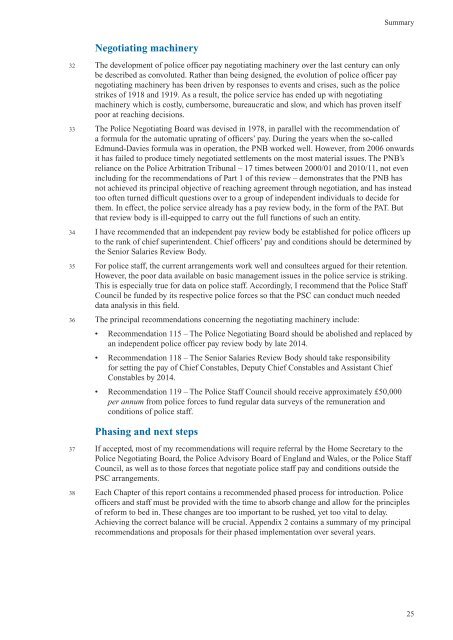Independent Review of Police Officer and Staff Remuneration and ...
Independent Review of Police Officer and Staff Remuneration and ...
Independent Review of Police Officer and Staff Remuneration and ...
Create successful ePaper yourself
Turn your PDF publications into a flip-book with our unique Google optimized e-Paper software.
Negotiating machinery<br />
Summary<br />
32 The development <strong>of</strong> police <strong>of</strong>ficer pay negotiating machinery over the last century can only<br />
be described as convoluted. Rather than being designed, the evolution <strong>of</strong> police <strong>of</strong>ficer pay<br />
negotiating machinery has been driven by responses to events <strong>and</strong> crises, such as the police<br />
strikes <strong>of</strong> 1918 <strong>and</strong> 1919. As a result, the police service has ended up with negotiating<br />
machinery which is costly, cumbersome, bureaucratic <strong>and</strong> slow, <strong>and</strong> which has proven itself<br />
poor at reaching decisions.<br />
33 The <strong>Police</strong> Negotiating Board was devised in 1978, in parallel with the recommendation <strong>of</strong><br />
a formula for the automatic uprating <strong>of</strong> <strong>of</strong>ficers’ pay. During the years when the so-called<br />
Edmund-Davies formula was in operation, the PNB worked well. However, from 2006 onwards<br />
it has failed to produce timely negotiated settlements on the most material issues. The PNB’s<br />
reliance on the <strong>Police</strong> Arbitration Tribunal – 17 times between 2000/01 <strong>and</strong> 2010/11, not even<br />
including for the recommendations <strong>of</strong> Part 1 <strong>of</strong> this review – demonstrates that the PNB has<br />
not achieved its principal objective <strong>of</strong> reaching agreement through negotiation, <strong>and</strong> has instead<br />
too <strong>of</strong>ten turned difficult questions over to a group <strong>of</strong> independent individuals to decide for<br />
them. In effect, the police service already has a pay review body, in the form <strong>of</strong> the PAT. But<br />
that review body is ill-equipped to carry out the full functions <strong>of</strong> such an entity.<br />
34 I have recommended that an independent pay review body be established for police <strong>of</strong>ficers up<br />
to the rank <strong>of</strong> chief superintendent. Chief <strong>of</strong>ficers’ pay <strong>and</strong> conditions should be determined by<br />
the Senior Salaries <strong>Review</strong> Body.<br />
35 For police staff, the current arrangements work well <strong>and</strong> consultees argued for their retention.<br />
However, the poor data available on basic management issues in the police service is striking.<br />
This is especially true for data on police staff. Accordingly, I recommend that the <strong>Police</strong> <strong>Staff</strong><br />
Council be funded by its respective police forces so that the PSC can conduct much needed<br />
data analysis in this field.<br />
36 The principal recommendations concerning the negotiating machinery include:<br />
• Recommendation 115 – The <strong>Police</strong> Negotiating Board should be abolished <strong>and</strong> replaced by<br />
an independent police <strong>of</strong>ficer pay review body by late 2014.<br />
• Recommendation 118 – The Senior Salaries <strong>Review</strong> Body should take responsibility<br />
for setting the pay <strong>of</strong> Chief Constables, Deputy Chief Constables <strong>and</strong> Assistant Chief<br />
Constables by 2014.<br />
• Recommendation 119 – The <strong>Police</strong> <strong>Staff</strong> Council should receive approximately £50,000<br />
per annum from police forces to fund regular data surveys <strong>of</strong> the remuneration <strong>and</strong><br />
conditions <strong>of</strong> police staff.<br />
Phasing <strong>and</strong> next steps<br />
37 If accepted, most <strong>of</strong> my recommendations will require referral by the Home Secretary to the<br />
<strong>Police</strong> Negotiating Board, the <strong>Police</strong> Advisory Board <strong>of</strong> Engl<strong>and</strong> <strong>and</strong> Wales, or the <strong>Police</strong> <strong>Staff</strong><br />
Council, as well as to those forces that negotiate police staff pay <strong>and</strong> conditions outside the<br />
PSC arrangements.<br />
38 Each Chapter <strong>of</strong> this report contains a recommended phased process for introduction. <strong>Police</strong><br />
<strong>of</strong>ficers <strong>and</strong> staff must be provided with the time to absorb change <strong>and</strong> allow for the principles<br />
<strong>of</strong> reform to bed in. These changes are too important to be rushed, yet too vital to delay.<br />
Achieving the correct balance will be crucial. Appendix 2 contains a summary <strong>of</strong> my principal<br />
recommendations <strong>and</strong> proposals for their phased implementation over several years.<br />
25

















